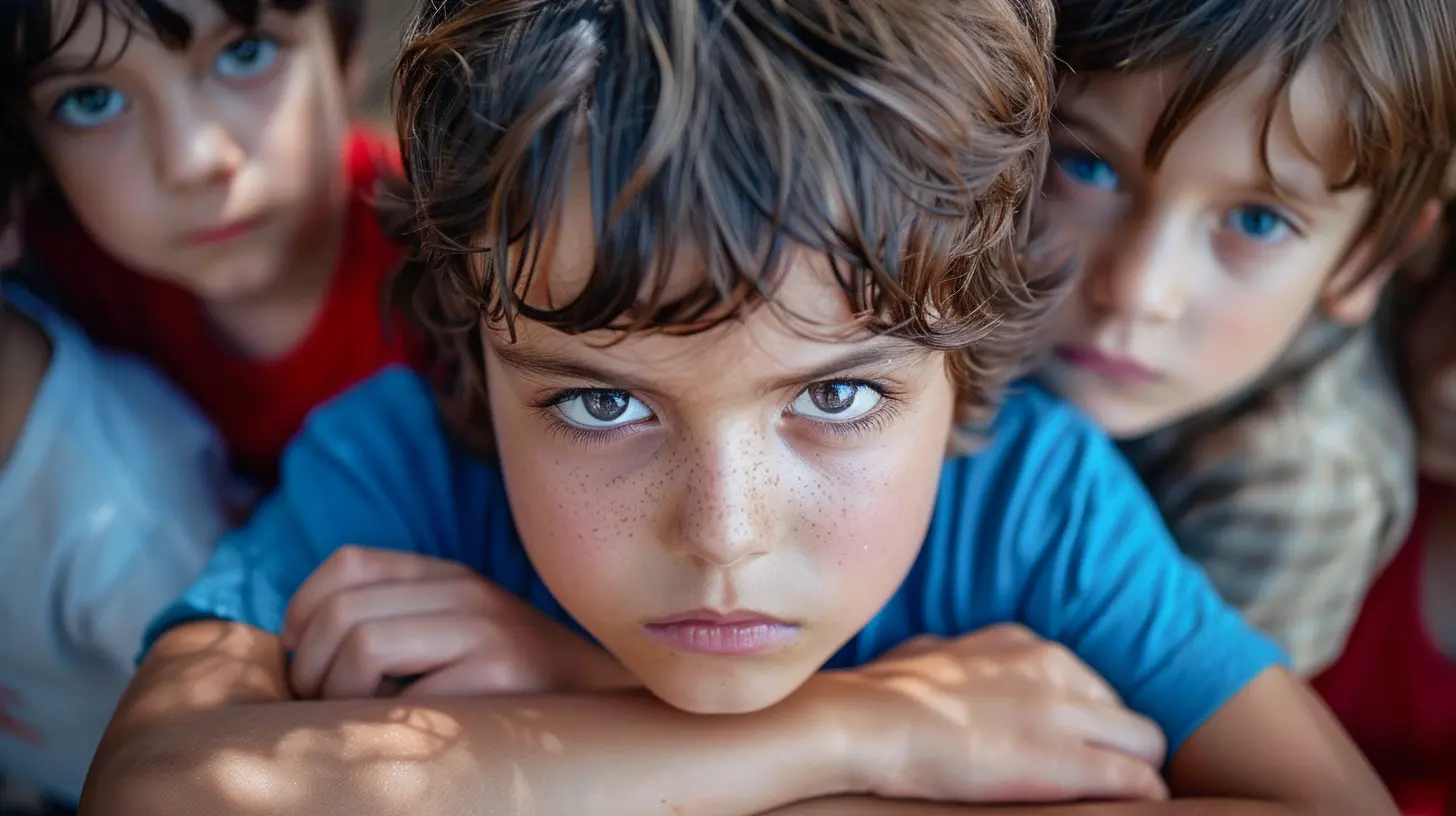Helping Your Child Navigate Peer Pressure
9 January 2025
As parents, we’ve all been there—wondering how to prepare our children for those moments when their friends, classmates, or teammates challenge their values or push them to do something they feel uncomfortable with. Peer pressure is one of those universal parenting hurdles that can crop up at any stage—whether it’s as small as trying to convince your six-year-old to share their favorite toy or as big as a teenager feeling pressured to drink at a party.
The bottom line? Peer pressure is inevitable. But the good news is that with the right tools, you can help your child learn how to handle it like a champ while still staying true to who they are. So, let’s dive into some actionable strategies, tips, and insights you can use to support your child in navigating the tricky waters of peer pressure.
What Is Peer Pressure, and Why Does It Matter?
Peer pressure is essentially the influence that friends, classmates, or social groups have on someone to think, act, or behave in a certain way. It can be as harmless as wearing a trendy outfit to fit in or as concerning as experimenting with risky behaviors like underage drinking.But why does this matter so much? Well, childhood and adolescence are critical periods for shaping identity, decision-making, and self-esteem. If your child gives in to peer pressure too often, it can chip away at their confidence and values. On the flip side, learning to handle peer pressure in healthy ways builds resilience and self-assuredness that will serve them for life. 
Signs Your Child Might Be Experiencing Peer Pressure
It’s not like your child is going to come up to you and say, “Hey, I’m struggling with peer pressure.” Often, it’s more subtle than that. Here's what to watch for:Behavioral Signs:
- Sudden changes in behavior: If your usually bubbly child is more withdrawn, it could signal they're grappling with external influences.- Trying to "fit in" excessively: Are they suddenly obsessing over dressing or acting a certain way to match their peers?
- Rule-breaking: If your child starts pushing boundaries they’ve respected before, peer influence could be at play.
Emotional Signs:
- Increased anxiety or stress: Feeling pressured can take an emotional toll, leaving kids feeling overwhelmed.- Lower self-confidence: If they seem unsure of themselves or overly reliant on others' approval, it might be related to peer dynamics.

Why Is Peer Pressure So Hard to Resist?
Let’s be real—resisting peer pressure is tough, even for adults. (Ever found yourself buying something you didn’t need because your friends had it?) For kids and teens, the stakes feel even higher. Here are a few reasons why saying “no” to peers can feel like climbing Everest:1. The Need to Belong: Humans are social creatures. Kids and teens, especially, crave acceptance and fear being left out.
2. Fear of Rejection: Saying “no” to friends might feel like risking the friendship.
3. Inexperience: Younger kids may not yet have the decision-making skills or emotional tools to stand their ground.
4. Groupthink: Ever heard the phrase “strength in numbers”? Being in a group can amplify conformity.
How to Help Your Child Navigate Peer Pressure
Now that we've unpacked why peer pressure can be so overwhelming, let’s switch gears and focus on equipping your child with strategies to handle it. Think of these tools as a “peer pressure survival kit” for your kiddo!1. Start with Open Communication
One of the best things you can do is create a safe space where your child feels comfortable sharing their experiences and feelings. Ask open-ended questions like, “What’s something your friends have asked you to do lately?” or “Have you ever felt unsure about doing something your friends wanted you to do?”
Avoid judgment when they answer—even if they admit to giving in to peer pressure before. Instead, focus on understanding their perspective and guiding them toward better choices next time.
2. Teach Them How to Say ‘No’
Sometimes, kids just need a little practice. Role-playing scenarios can be super helpful. Sit down and act out situations they might encounter, like a friend asking them to skip homework or try smoking. Teach them simple yet effective ways to say “no” without causing drama, like:
- “Nah, I can’t. My parents would kill me.”
- “No thanks, I’m good.”
- “I don’t feel comfortable doing that.”
Think of these as their go-to scripts—they’ll feel more confident if they’ve rehearsed ahead of time.
3. Boost Their Self-Confidence
Confident kids are less likely to feel the need to follow the crowd. Encourage your child to pursue interests and hobbies where they can excel and feel good about themselves, whether it's playing a sport, joining a club, or exploring art and music. When they feel capable and proud of who they are, they’re less likely to buckle under peer pressure.
4. Help Them Identify True Friends
Not all friends are created equal. It’s important to help your child distinguish between friends who respect their boundaries and those who don’t. A true friend won’t push them to do something they’re uncomfortable with. Talk to your child about the qualities of a good friend—loyalty, respect, kindness—and encourage them to gravitate toward people who uplift them rather than pressure them.
5. Set Clear Expectations (and Stick to Them)
Your child needs to know where you stand on certain topics, whether it’s underage drinking, vaping, or skipping school. Be clear about your family’s values, but approach these conversations with empathy rather than a strict “because I said so” attitude. Let them know why you care about their choices and how those choices align with their long-term goals.
6. Encourage Critical Thinking
Teach your child to think independently by asking questions like, “How do you think this would affect you in the long run?” or “What would you do if things didn’t go as planned?” Helping them weigh pros and cons empowers them to make reasoned decisions—even in the heat of the moment.
7. Be a Role Model
Kids are like sponges—they absorb what they see from us. If you’re someone who stands firm in your values and isn’t afraid to say “no” (whether it’s to an over-commitment at work or a toxic friendship), they’ll take note. Show them that it’s okay to prioritize your own needs over others’ expectations.
What to Do If They’ve Already Given In to Peer Pressure
First off, don’t panic. Making mistakes is part of growing up, and it’s how kids learn. If your child confides in you about a choice they regret, focus on helping them reflect on what happened and how they can handle things differently next time.Ask questions like:
- “What made you feel like you had to go along with it?”
- “How did that choice make you feel afterward?”
- “What could you do differently next time?”
This approach teaches accountability without shaming them, which is key to maintaining trust and open communication.
The Long Game: Building Resilience Over Time
Let’s face it—peer pressure isn’t going anywhere. But if you focus on building your child’s self-esteem, communication skills, and decision-making abilities, they’ll have the confidence to stay true to themselves no matter what life throws their way.Think of it like teaching them to swim. At first, you’re in the water with them, guiding their movements. But eventually, they’ll paddle out on their own, equipped with the skills to navigate even the deepest waters.
Final Thoughts
Helping your child navigate peer pressure isn’t about shielding them from every difficult situation—it’s about giving them the tools and confidence to face challenges head-on. Remember, they’re not going to nail it every time (and neither will you as a parent), but these experiences are what help them grow. Be patient, stay engaged, and keep the lines of communication open. Together, you’ll get through it.all images in this post were generated using AI tools
Category:
Parenting TipsAuthor:

Tara Henson
Discussion
rate this article
13 comments
Archer Moore
Navigating peer pressure can be challenging for both kids and parents. Remember, open communication and a supportive environment are key. Encourage your child to express their feelings and be proud of their choices; you're guiding them toward resilience.
March 27, 2025 at 3:57 AM

Tara Henson
Thank you for your thoughtful insights! Open communication is indeed essential in helping children build resilience against peer pressure.
Chloe King
Empowering our children to handle peer pressure is a vital gift we can give them. By fostering open communication, encouraging self-confidence, and modeling positive choices, we help them navigate challenges with courage and resilience. Together, let's equip our kids to embrace their individuality and make choices that reflect their true selves!
February 16, 2025 at 5:47 AM

Tara Henson
Absolutely! Empowering children through open communication and self-confidence is key to helping them thrive amidst peer pressure. Together, we can guide them to make authentic choices.
Hudson McNeely
This article effectively highlights the nuanced role parents play in guiding children through peer pressure. By fostering open communication and encouraging critical thinking, parents can empower their children to make confident decisions. Practical strategies, such as role-playing scenarios, offer tangible support, enhancing resilience and promoting healthier social interactions.
February 6, 2025 at 5:45 PM

Tara Henson
Thank you for your insightful comment! I'm glad you found the strategies helpful in empowering parents to support their children through peer pressure.
Sofia Burton
What a wonderful resource! Your insights on helping children navigate peer pressure are so valuable. Thank you for sharing these practical tips for empowering our kids!
January 30, 2025 at 4:27 AM

Tara Henson
Thank you so much for your kind words! I'm glad you found the tips helpful for empowering our kids.
Natalia Black
Empower your child with confidence and open communication to resist peer pressure.
January 25, 2025 at 5:35 AM

Tara Henson
Absolutely! Encouraging open communication and building confidence are key strategies in helping children stand strong against peer pressure.
Nixie McKay
Remember, if your kid’s superhero power is dodging peer pressure, they might just need a cape and a snack!
January 19, 2025 at 3:18 PM

Tara Henson
Absolutely! A little humor and encouragement can go a long way in helping kids feel empowered to handle peer pressure. A cape and a snack make for a fun and supportive approach!
Jax McGowan
Empower your child with confidence and critical thinking; the best shield against peer pressure is a strong sense of self—let them stand tall in their choices!
January 15, 2025 at 5:13 PM

Tara Henson
Absolutely! Instilling confidence and critical thinking equips children to make informed choices and resist peer pressure effectively.
Beth Gates
Navigating peer pressure can feel like a wild ride! Remember, equipping your child with confidence and open communication is key. Celebrate small victories together, and remind them that being true to themselves is always the best choice!
January 14, 2025 at 3:18 PM

Tara Henson
Absolutely! Empowering children through confidence and open dialogue is essential for navigating peer pressure successfully. Celebrating their authenticity is key!
Reid Riggs
This article offers valuable strategies for empowering children to resist peer pressure. However, it could benefit from deeper insights into the influence of social media on modern peer dynamics, as digital interactions often complicate traditional approaches to navigating these pressures.
January 14, 2025 at 4:15 AM

Tara Henson
Thank you for your valuable feedback! I appreciate your suggestion and will consider incorporating insights on social media's impact in future revisions.
Lulu Thompson
Navigating peer pressure? Just remind your kid that even superheroes sometimes say 'no'—and if all else fails, bribe them with pizza. Works every time!" 🍕🦸♂️
January 11, 2025 at 5:31 PM

Tara Henson
Great advice! Using relatable examples and rewarding strategies can empower kids to make confident choices. 🍕🦸♂️
Maribel Beck
Navigating peer pressure is crucial for children’s development. Empowering them with strong decision-making skills, fostering open communication, and cultivating self-esteem can help them confidently resist negative influences and make positive choices.
January 10, 2025 at 3:25 PM

Tara Henson
Thank you for your insightful comment! Empowering children with decision-making skills and self-esteem is indeed essential for helping them navigate peer pressure effectively.
Annette McManus
Navigating peer pressure is a vital life skill for children. Empower them to make decisions by fostering open communication, teaching critical thinking, and modeling confidence. Encourage self-identity and values, allowing them to stand firm in their choices while respecting friendships—this builds resilience and authentic connections.
January 10, 2025 at 5:17 AM

Tara Henson
Absolutely! Empowering children through open communication and critical thinking is essential for building resilience and helping them stay true to their values amidst peer pressure.
Nyx McIlwain
Supporting your child through peer pressure builds resilience and strengthens your bond together.
January 9, 2025 at 5:36 AM

Tara Henson
Absolutely! Supporting your child through peer pressure not only helps them develop resilience but also fosters a stronger, more trusting relationship between you.
MORE POSTS

Stress-Free Morning Routines Every Parent Needs

Fun Ways to Teach Kids About Healthy Eating

Helping Your Child Overcome Social Anxiety in School and Beyond

Promoting a Positive Relationship With Food in Your Children

Encouraging Brain Growth with Educational After-School Games

Storytime Activities to Enhance Your Child’s Reading Experience

Teaching Kids Empathy in a World That’s Often Unkind

Understanding Allergies in Babies and Early Detection

Understanding Childhood Vaccines: What Parents Need to Know